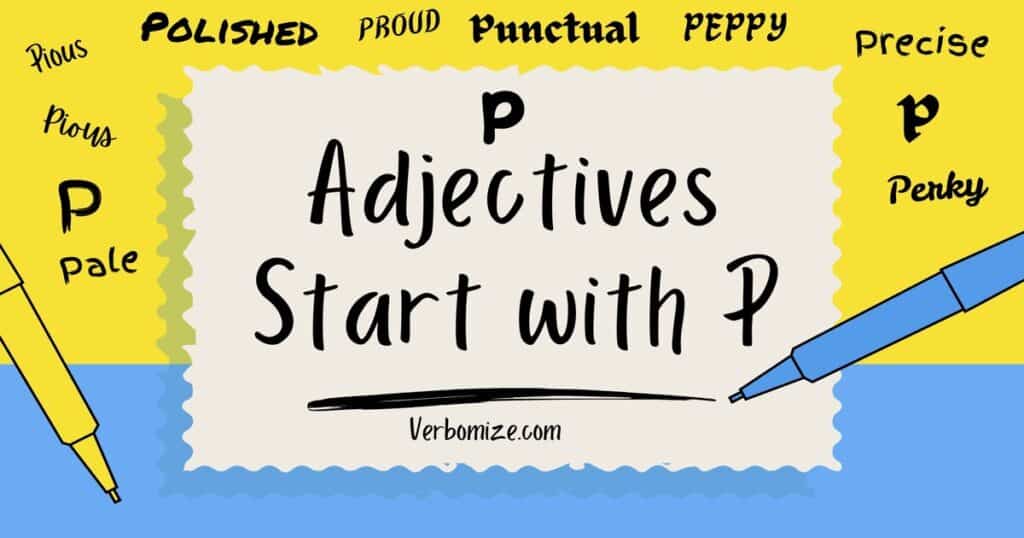Adjectives that start with P can add a powerful punch to your writing, sparking interest and making your descriptions stand out. Whether you’re aiming for vivid storytelling or simply want to spice up your daily vocabulary, these words are sure to impress.
Ready to level up your language? In this article, you’ll discover a treasure trove of dynamic P-adjectives that will enhance your communication and give your words more flair. Let’s dive in and explore the exciting possibilities these words can bring to your conversations and writing!
What Are Adjectives for P?
Adjectives for “P” are descriptive words that help enhance our understanding of people, places, objects, and actions, all starting with the letter “P.” These adjectives cover a wide range of qualities, from personality traits like “pensive” or “pompous,” to physical characteristics like “pale” or “portly.” They also describe emotions, such as “pessimistic” or “playful,” and actions, such as “prolific” or “precise.” Whether describing a calm scene with “placid” waters or a complex situation as “pivotal,” adjectives for “P” provide a rich vocabulary to convey details with clarity and creativity.
Powerful Positive Adjectives: Describing the Best of Life
When you want to describe something or someone in the best possible light, these adjectives can help you convey positivity and enthusiasm. Whether you’re complimenting a friend or highlighting the strengths of a project, these words will express admiration and praise.
- Proud – Feeling satisfaction or accomplishment.
- Passionate – Showing or expressing intense emotion or enthusiasm.
- Pioneering – Leading the way in a particular field or activity.
- Proficient – Highly skilled or capable.
- Polished – Refined, sophisticated, or highly skilled in appearance or performance.
- Perceptive – Quick to notice or understand things.
- Precise – Exact, accurate, and detailed.
- Prominent – Well-known or important in a particular context.
These positive adjectives are perfect for elevating compliments or highlighting achievements. For example, you might say, “Her passionate commitment to the project made her a prominent figure in the company,” or “The speaker’s perceptive analysis of the issue was both precise and profound.”
Practical and Purposeful Adjectives: Describing Functionality and Effectiveness
Not every situation calls for a grand display of emotions. Sometimes, it’s essential to use adjectives that emphasize practicality, reliability, and purpose. These words come in handy when describing functionality and real-world effectiveness, making them ideal for professional settings.
- Practical – Useful and sensible in real-world situations.
- Purposeful – Having a clear aim or objective.
- Proven – Demonstrated to be effective or successful.
- Productive – Yielding positive results or achievements.
- Pragmatic – Dealing with things realistically and sensibly.
- Persistent – Continuing firmly despite difficulties or obstacles.
- Punctual – Arriving or doing something at the expected time.
For instance, when describing a team member’s work ethic, you could say, “Her persistent efforts and pragmatic approach led to the productive completion of the project.” Or, if discussing a product: “This tool is proven to deliver practical solutions for small businesses.”
Pensive and Profound Adjectives: Describing Deep Thoughts
Some moments in life prompt deeper reflection. These adjectives are ideal for capturing thoughtful, reflective, and sometimes philosophical moods or concepts. They help convey a sense of seriousness and contemplation.
- Philosophical – Relating to deep thoughts about life or existence.
- Pensive – Engaged in serious or deep thought.
- Profound – Having deep meaning or significance.
- Paradoxical – Seemingly contradictory but perhaps true.
- Precarious – Risky or uncertain, often in a dangerous way.
- Platonic – Relating to non-romantic or non-sexual relationships or ideas.
For example, you could say, “He had a philosophical perspective on the matter, offering profound insights that challenged everyone to think more deeply.” Or, when discussing an emotional moment: “The poignant scene left the audience in tears, with its paradoxical combination of joy and sadness.”
positive adjectives that start with p
Life isn’t always about seriousness; sometimes it’s about fun, playfulness, and joy. These adjectives are perfect for situations that require a light, humorous, or energetic touch. Use them when you want to describe something in a lively and upbeat manner.
- Playful – Full of fun or lighthearted behavior.
- Perky – Cheerful and lively.
- Pleasing – Giving pleasure or satisfaction.
- Pompous – Having an exaggerated sense of self-importance.
- Peppy – Energetic and lively.
- Picturesque – Visually charming, like a picture.
- Perfunctory – Done with minimal effort, typically in a routine manner.
For example, when describing a fun event: “The playful banter between the performers added to the overall peppy vibe of the show.” Or for a scene: “The picturesque view of the countryside was absolutely pleasing, offering a peaceful escape from the hustle of the city.”
Adjectives of the Unexpected: Describing Surprises or Challenges
Life often throws surprises and challenges our way, and these adjectives help to express unexpected or unusual circumstances. They provide the perfect vocabulary for moments that defy the ordinary or require quick adaptability.
- Puzzling – Difficult to understand or solve.
- Perturbed – Disturbed or unsettled by something unexpected.
- Pivotal – Of crucial importance to a situation or outcome.
- Perilous – Full of danger or risk.
- Prodigious – Remarkably impressive or large in size or extent.
- Preemptive – Taken as a precaution or to prevent an anticipated event.
- Prejudiced – Showing bias or unfair judgment before having all the facts.
Imagine a scenario where a company is facing an unexpected crisis: “The team’s ability to navigate this puzzling situation was pivotal in overcoming the perilous challenge.” Or, in describing a major achievement: “The prodigious effort put into the project paid off when it was completed ahead of schedule.”
Pivotal Personal Traits: Describing Personal Characteristics
Understanding people’s personalities can be complex, but with the right adjectives, you can describe a person’s core traits in a more vivid way. These adjectives help you express someone’s nature, mood, or actions.
- Perceptive – Quick to notice or understand things.
- Pompous – Self-important and pretentious.
- Patient – Able to accept or tolerate delays or problems without frustration.
- Pious – Devoutly religious or virtuous.
- Pragmatic – Focused on practical outcomes rather than theory.
- Pensive – Engaged in serious thought, often with a sense of melancholy.
- Presumptuous – Overstepping boundaries by assuming too much.
- Punctilious – Paying attention to detail and correctness.
These adjectives are useful when describing a person’s behavior, attitude, or mindset. For example: “She remained patient throughout the entire process, offering perceptive advice at every step.”
Places and Settings: Painting the Scene with Precision
The environment or setting can set the tone of a story or conversation. These adjectives help bring places to life, whether you’re talking about a natural landscape or a particular location’s mood.
- Picturesque – Visually attractive, like a picture.
- Peculiar – Strange or odd, often in a charming or interesting way.
- Pristine – Clean, fresh, and unspoiled.
- Populous – Having a large population; crowded.
- Plush – Luxurious or richly furnished.
- Portentous – Full of significance, often with a feeling of forewarning.
- Pale – Light in color, often associated with a ghostly or weak quality.
- Precarious – Unstable, risky, or insecure.
For example, a description of a vacation destination might go: “The picturesque village by the lake had pristine waters and plush accommodations.” Or for an eerie setting: “The portentous clouds gathered, making the scene feel precarious.”
Objects and Things: Detailed Descriptions for the Inanimate
When describing things, these adjectives are perfect for highlighting characteristics that make objects stand out or contribute to the overall feel of a scene.
- Polished – Smooth and shiny due to polishing.
- Pliable – Easily bent or shaped; flexible.
- Practical – Suitable for use or action, not overly decorative.
- Plain – Simple and unadorned.
- Precious – Highly valued or cherished.
- Pale – Light or faded in color, often associated with delicacy.
- Pernicious – Harmful, especially in a subtle way.
- Prosaic – Ordinary, dull, or unimaginative.
Consider how you’d describe a gift: “The polished silver jewelry was a precious token of love.” Or when talking about a design: “The plain yet practical nature of the chair made it ideal for everyday use.”
Emotions and States of Being: Exploring the Depths of Feeling
Emotions are powerful, and these adjectives help you articulate the various states of mind or heart people may experience. Whether you’re feeling excited, anxious, or nostalgic, these words capture the essence of emotions.
- Pensive – Reflective or thoughtful, often in a slightly melancholic way.
- Puzzled – Confused or unsure.
- Pained – Experiencing physical or emotional discomfort.
- Playful – Full of fun, lighthearted.
- Proud – Having a feeling of self-respect or admiration.
- Perturbed – Disturbed or unsettled, often emotionally.
- Provoked – Stirred up or irritated, often to action.
For example, you might say, “His pensive gaze showed a mind deep in thought, while her provoked reaction was hard to ignore.” Or when feeling content: “The pleasant conversation left everyone feeling warm and proud of their contributions.”
Sensory Descriptions: Enriching the Experience
Adjectives can also describe what we see, taste, smell, hear, and touch. These sensory adjectives bring an experience to life, making it more relatable and tangible.
- Piercing – Sharp or intense, often used to describe sounds or sensations.
- Pungent – Strongly smelling or tasting, often sharp and overwhelming.
- Prickly – Having a sharp or irritating quality, as in texture or feeling.
- Pleasant – Agreeable to the senses.
- Plush – Soft, comfortable, and luxurious to the touch.
- Pale – Light or lacking color, often used to describe a lack of vibrancy.
- Pitchy – Having a high-pitched or shrill quality, usually with sound.
- Pallid – Pale, often implying a lack of color or energy.
For example, you could describe a smell: “The pungent aroma of fresh garlic filled the kitchen.” Or an uncomfortable texture: “The prickly fabric made the sweater hard to wear.”
Positive Qualities: Expressing Excellence and Merit
Sometimes we need adjectives that elevate the description of someone’s work, achievements, or inherent qualities. These words are perfect for praising someone or something with respect to excellence.
- Prodigious – Extraordinary in size, quantity, or degree.
- Pristine – In its original condition, unspoiled.
- Pertinent – Relevant and appropriate to the situation.
- Prolific – Producing a large number of works or results.
- Praiseworthy – Deserving of praise, commendable.
- Professional – Exhibiting competence and skill in a given field.
- Precocious – Developing abilities earlier than usual, often applied to children.
- Persuasive – Having the ability to convince others.
For instance, describing a writer: “Her prolific output of novels earned her a place among the praiseworthy authors of her generation.” Or, when describing a student’s abilities: “The precocious child stunned everyone with her professional presentation on the topic.”
Challenges and Obstacles: Describing Difficult Situations
Life isn’t always smooth sailing, and these adjectives help express challenging, difficult, or uncomfortable situations.
- Perilous – Full of danger or risk.
- Perturbed – Agitated or distressed, often due to a troubling situation.
- Peculiar – Unusual or strange, often difficult to understand.
- Precarious – Dangerous or unstable, with an uncertain outcome.
- Pessimistic – Expecting the worst, often overly negative.
- Procrastinated – Delayed or put off for too long.
- Plagued – Troubled or burdened with persistent problems.
- Pernicious – Harmful in a gradual or subtle way.
People and Personalities: Describing Character Traits
In every interaction, whether personal or professional, we encounter different personalities. These adjectives are perfect for depicting those complex and varied traits that make us who we are.
- Pioneering – Showing the ability to lead or be the first in a particular field.
- Persevering – Continuing to do something despite difficulties or delays.
- Pertinacious – Persistent or stubborn in holding onto an opinion or course of action.
- Provincial – Narrow-minded or unsophisticated.
- Pragmatic – Dealing with things sensibly and realistically.
- Pleasant – Giving a sense of satisfaction or enjoyment; agreeable.
- Pompous – Excessively self-important or arrogant.
- Pensive – Engaged in serious thought, especially in a melancholic way.
For instance, you might describe someone like this: “Her pioneering attitude has led to numerous breakthroughs, while her persevering spirit ensures no challenge is too great.”
Emotions and Feelings: Navigating the Inner World
Our emotions can sometimes be difficult to articulate, but with the right adjectives, we can better convey how we feel. These adjectives will help express a variety of emotional states.
- Placid – Calm and peaceful.
- Pessimistic – Tending to expect the worst or focus on negative outcomes.
- Proud – Feeling deep satisfaction and admiration for one’s achievements.
- Pained – Suffering from physical or emotional distress.
- Proud – Having a strong sense of self-respect and dignity.
- Panicked – Experiencing sudden, overwhelming fear or anxiety.
- Perplexed – Filled with confusion, unsure how to proceed.
- Playful – Lighthearted and full of fun.
You could say, “His pessimistic outlook on the situation made it hard for him to see any potential solutions,” or “After the long day, she felt placid and content, ready to relax.”
Nature and Environment: Bringing the Outdoors In
Whether describing a beautiful landscape or a turbulent storm, these adjectives are ideal for capturing the essence of nature and the environment around us.
- Pristine – Clean, unspoiled, or untouched by human influence.
- Picturesque – Visually attractive, like a scene from a painting.
- Pale – Lacking in color or vibrancy, often used for landscapes or faces.
- Pungent – Having a strong, often overpowering smell.
- Perennial – Lasting for a long time or recurring regularly.
- Placid – Calm and still, often used to describe bodies of water.
- Precarious – Dangerous or unstable, often due to uncertainty.
- Prominent – Easily noticeable, outstanding, or significant.
For example, describing a landscape: “The picturesque hills were bathed in soft sunlight, and the pristine waters of the lake mirrored the sky perfectly.” Or, describing a storm: “The precarious winds made the situation feel dangerous.”
Actions and Movements: Describing How Things Move
When you want to describe motion or actions, these adjectives provide a variety of ways to articulate how something moves or behaves.
- Pulsating – Beating or throbbing rhythmically, often associated with energy or life.
- Prolific – Producing many things in a short period of time.
- Prompt – Done without delay; immediate.
- Perfunctory – Done in a routine or mechanical way, often without much care or enthusiasm.
- Pernicious – Having a harmful effect, often in a subtle or gradual way.
- Pacing – Moving back and forth, often with agitation or nervousness.
- Prancing – Moving with a lively, exaggerated, or springy step.
- Plodding – Moving with slow, heavy steps, often due to exhaustion or determination.
For example: “The artist was prolific in his output, creating multiple masterpieces each month,” or “He started pacing nervously, waiting for the important call.”
Objects and Things: Describing Physical Objects and Qualities
Describing physical attributes and characteristics of things is key to creating vivid imagery. These adjectives help you paint a clear picture of the world around you.
- Pale – Light in color, often used for skin tone or surfaces.
- Pliant – Flexible or easily bent without breaking.
- Pockmarked – Marked with small, round indentations, often used to describe surfaces or skin.
- Pungent – Strong, sharp, often overpowering in taste or smell.
- Polished – Shiny and smooth, often due to rubbing or refinement.
- Portly – Rather fat or overweight, often used to describe a person’s build.
- Pragmatic – Practical and focused on function over style.
- Peculiar – Strange or unusual, often in a way that makes something stand out.
For instance, you could describe a person’s appearance: “He had a portly frame, but his polished demeanor made him stand out at the event.” Or describing a texture: “The pliant leather was soft and easy to bend.”
Intellectual Qualities: Describing Mental Capacity and Intelligence
Whether you’re discussing someone’s thinking, analysis, or overall intellect, these adjectives will help define cognitive traits and intellectual capabilities.
- Perceptive – Quick to notice or understand things.
- Pithy – Brief and forceful in expression; concise but full of meaning.
- Pragmatic – Focused on practical and real-world results, not on theoretical aspects.
- Philosophical – Reflecting a thoughtful, deep approach to questions about life and existence.
- Prodigious – Extraordinary in size, quantity, or degree.
- Proficient – Highly skilled and competent.
- Puzzling – Difficult to understand or figure out.
- Precocious – Showing advanced abilities or maturity at an unusually early age.
You might say, “Her perceptive insights into human behavior helped shape the success of the project,” or “The prodigious effort required for the analysis left everyone in awe of his abilities.”
Describing Time and Change: Exploring the Flow of Life
Time and change shape every aspect of our lives. These adjectives describe the passage of time, seasons, or the gradual shifts in circumstances.
- Pivotal – Of crucial importance to a particular moment or event.
- Perpetual – Continuing without interruption or change.
- Preliminary – Relating to the early stages or preparations for something.
- Periodic – Happening at regular intervals.
- Permanent – Lasting or intended to last for a long time or indefinitely.
- Prolonged – Extended or drawn out over a period of time.
- Progressive – Moving forward or advancing, often used in political or social contexts.
For example, you could say: “The pivotal decision made in that meeting altered the course of the project,” or “The pastoral scene outside the cabin brought a sense of tranquility.”
negative adjectives that start with p
Not all adjectives are positive, and there are times when it’s necessary to express negative qualities. These adjectives describe undesirable behaviors or qualities.
- Perfidious – Deceitful and untrustworthy.
- Pernicious – Having a harmful or damaging effect, often gradually.
- Petty – Of little importance or trivial; small-minded.
- Pretentious – Attempting to impress others with exaggerated importance or talent.
- Pompous – Characterized by arrogance or self-importance.
- Prejudiced – Biased or judgmental without sufficient knowledge.
- Peevish – Irritable or easily annoyed.
- Paranoid – Distrustful or overly suspicious of others.
For instance, when describing a negative person: “His perfidious actions caused irreparable damage to his reputation,” or describing a small conflict: “Her petty concerns overshadowed the more important issues.”
Conclusion: Power Up Your Vocabulary with P-Starting Adjectives
Adjectives are more than just descriptors—they are powerful tools that help shape the way we communicate. Whether you’re aiming to highlight someone’s strengths, describe a situation with precision, or express an emotion with depth, these adjectives starting with “P” can enhance your vocabulary and make your language more engaging.
By integrating words like proficient, persistent, picturesque, and pivotal, you’ll find yourself crafting more impactful and memorable statements. So, the next time you’re looking to add flair to your conversation or writing, remember these adjectives and watch your words take on new life.
Take the time to incorporate these words into your daily communication, and you’ll not only sound more articulate but also feel more confident in expressing your thoughts and ideas. Ready to level up your vocabulary? Start practicing these “P” adjectives today, and notice how they enrich your expression!
Quiz: Adjectives Starting with “P”
1. Which of the following adjectives best describes someone who shows persistence and continues to work hard despite challenges?
- a) Pompous
- b) Perplexed
- c) Persevering
- d) Pessimistic
Answer: c) Persevering
2. Which adjective describes a place that is visually attractive, like a scene from a painting?
- a) Peculiar
- b) Picturesque
- c) Pompous
- d) Placid
Answer: b) Picturesque
3. What adjective would best describe a person who remains calm and unbothered, even in stressful situations?
- a) Perplexed
- b) Pensive
- c) Pompous
- d) Placid
Answer: d) Placid
4. Which of the following adjectives describes a physical object that is smooth, shiny, and has been refined through polishing?
- a) Pliant
- b) Pale
- c) Polished
- d) Perplexed
Answer: c) Polished
5. What adjective is used to describe a person who thinks deeply, often in a reflective or melancholic way?
- a) Pompous
- b) Perfunctory
- c) Pensive
- d) Playful
Answer: c) Pensive
6. Which adjective would you use to describe something that has a strong and overpowering smell?
- a) Polished
- b) Pungent
- c) Perfunctory
- d) Plodding
Answer: b) Pungent
7. Which adjective would be appropriate to describe a place or situation that is dangerous and unstable?
- a) Perpetual
- b) Precarious
- c) Pleasing
- d) Pivotal
Answer: b) Precarious
8. What adjective best describes someone who is narrow-minded or lacks sophistication?
- a) Provincial
- b) Professional
- c) Perceptive
- d) Pompous
Answer: a) Provincial
9. Which adjective would you use to describe something or someone that is overly showy or self-important?
- a) Playful
- b) Pompous
- c) Pivotal
- d) Plodding
Answer: b) Pompous
10. Which adjective would best describe a person who has advanced abilities or maturity at an unusually early age?
- a) Prodigious
- b) Precocious
- c) Perplexed
- d) Pensive
Answer: b) Precocious
11. Which adjective describes a situation or action that is carried out in a routine or mechanical way, often without enthusiasm?
- a) Pragmatic
- b) Punctual
- c) Perfunctory
- d) Pensive
Answer: c) Perfunctory
12. Which adjective would you use to describe a piece of writing or speech that is brief but full of meaning?
- a) Perceptive
- b) Pithy
- c) Pale
- d) Peculiar
Answer: b) Pithy
13. Which adjective is used to describe something that is easily bent or shaped without breaking?
- a) Pliant
- b) Pompous
- c) Pungent
- d) Prolific
Answer: a) Pliant
14. Which adjective describes something or someone that is full of fun, lightheartedness, and energy?
- a) Pensive
- b) Proud
- c) Playful
- d) Perplexed
Answer: c) Playful
15. Which adjective would best describe a harmful effect that is subtle and gradual over time?
- a) Prolonged
- b) Pernicious
- c) Pompous
- d) Precocious
Answer: b) Pernicious
16. What adjective describes an event that is of crucial importance, often marking a turning point?
- a) Perfunctory
- b) Pivotal
- c) Pale
- d) Pompous
Answer: b) Pivotal

Jone Smith is an experienced blogger and content creator behind Verbo Mize. With a passion for storytelling and insightful commentary, Jone brings a wealth of knowledge on diverse topics. His expertise in blogging, combined with a keen eye for detail, makes his work both informative and engaging, offering readers valuable perspectives on a wide range of subjects.







